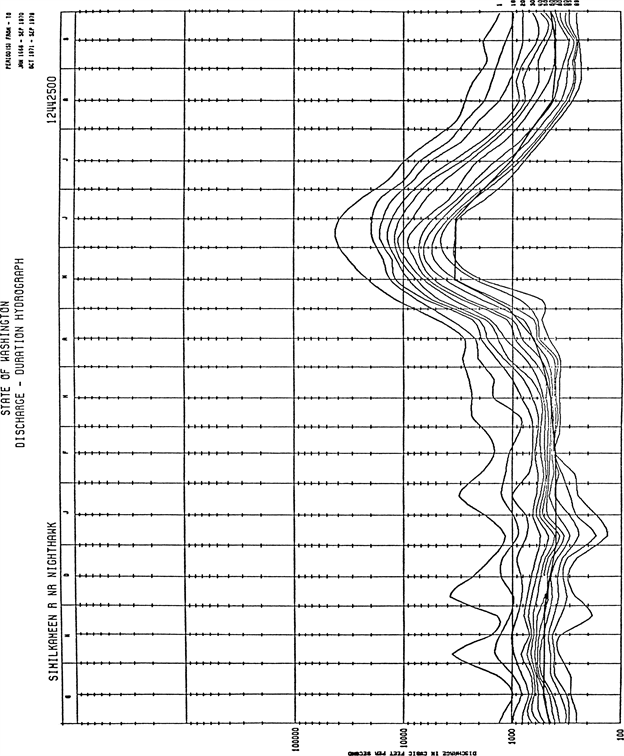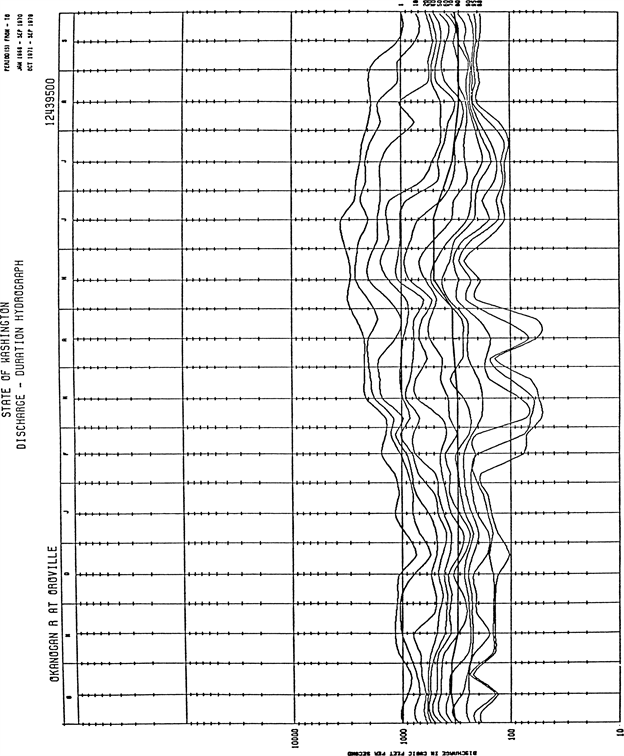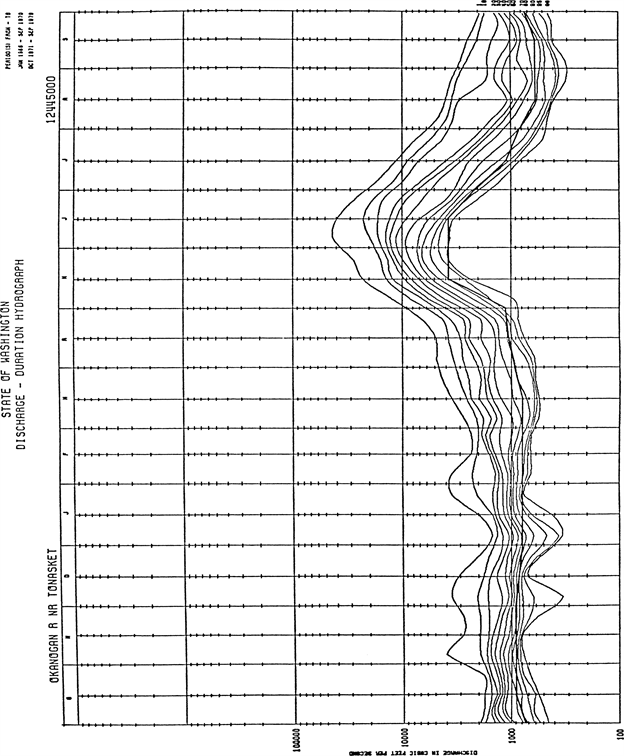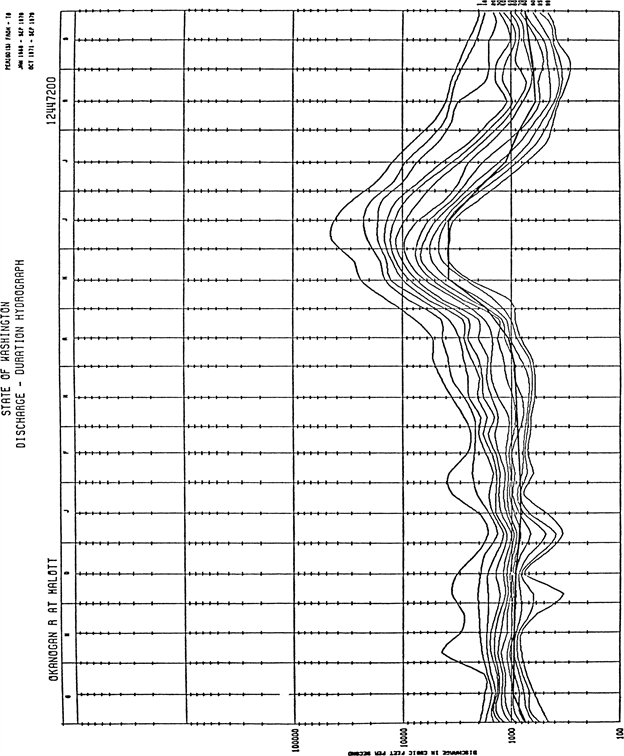Chapter 173-549 WAC
Last Update: 6/9/88WATER RESOURCES PROGRAM IN THE OKANOGAN RIVER BASIN, WRIA 49
WAC Sections
| HTMLPDF | 173-549-010 | General provision. |
| HTMLPDF | 173-549-015 | Purpose. |
| HTMLPDF | 173-549-016 | Definition. |
| HTMLPDF | 173-549-020 | Establishment of minimum instream flows. |
| HTMLPDF | 173-549-025 | Stream closures. |
| HTMLPDF | 173-549-027 | Policy statement for future permitting actions. |
| HTMLPDF | 173-549-035 | Lakes. |
| HTMLPDF | 173-549-060 | Groundwater. |
| HTMLPDF | 173-549-070 | Effect on prior rights and exemptions. |
| HTMLPDF | 173-549-080 | Future rights. |
| HTMLPDF | 173-549-090 | Enforcement. |
| HTMLPDF | 173-549-095 | Appeals. |
| HTMLPDF | 173-549-100 | Regulation review. |
| HTMLPDF | 173-549-900 | Minimum instream flow hydrographs. |
DISPOSITION OF SECTIONS FORMERLY CODIFIED IN THIS TITLE
| 173-549-030 | Future allocations—Reservation of surface water for beneficial uses. [Order DE 76-25, § 173-549-030, filed 7/14/76.] Repealed by WSR 84-13-076 (Order DE 84-15), filed 6/20/84. Statutory Authority: Chapters 90.54 and 90.22 RCW. |
| 173-549-040 | Priority of future water rights during times of water shortage. [Order DE 76-25, § 173-549-040, filed 7/14/76.] Repealed by WSR 84-13-076 (Order DE 84-15), filed 6/20/84. Statutory Authority: Chapters 90.54 and 90.22 RCW. |
| 173-549-050 | Streams and lakes closed to further consumptive appropriations. [Order DE 76-25, § 173-549-050, filed 7/14/76.] Repealed by WSR 84-13-076 (Order DE 84-15), filed 6/20/84. Statutory Authority: Chapters 90.54 and 90.22 RCW. |
PDF173-549-010
General provision.
These rules apply to waters within the Okanogan River Basin (WRIA 49) as defined in WAC 173-500-040. This chapter is promulgated pursuant to chapter 90.54 RCW (the Water Resources Act of 1971) and chapter 90.22 RCW (Minimum water flows and levels) and in accordance with chapter 173-500 WAC (Water resources management program).
PDF173-549-015
Purpose.
Chapter 90.54 RCW (the Water Resources Act of 1971) requires that utilization and management of the waters of the state shall be guided by a number of fundamentals, including the following:
"(1) Uses of water for domestic, stock watering, industrial, commercial, agricultural, irrigation, hydroelectric power production, mining, fish and wildlife maintenance and enhancement, recreational, and thermal power production purposes, and preservation of environmental and aesthetic values, and all other uses compatible with the enjoyment of the public waters of the state, are declared to be beneficial." (RCW 90.54.020(1).)
The act further specifies that "Perennial rivers and streams of the state shall be retained with base flows necessary to provide for preservation of wildlife, fish, scenic, aesthetic and other environmental values, and navigational values." (RCW 90.54.020 (3)(a).)
The purpose of this chapter is to satisfy the requirements of RCW 90.54.020 (3)(a) while, at the same time, allowing the continued use of water for other beneficial uses such as agriculture, which is acknowledged as a vital activity greatly benefiting the citizens of the Okanogan Basin and the state of Washington.
PDF173-549-016
Definition.
PDF173-549-020
Establishment of minimum instream flows.
(1) Minimum instream flows are established for stream management units with monitoring to take place at certain control points as follows:
Stream Management Unit Information
Stream Management Unit Name, Control Station Name and Number | Control Station Location by River Mile, Section, Township, Range | Affected Stream Reach | |
Lower Okanogan | |||
Okanogan R. at Malott (12447200) | 17.0, 9-32-25E | Okanogan River confluence with Wells Pool to confluence of Chewiliken Cr. | |
Middle Okanogan | |||
Okanogan R. nr. Tonasket (12445000) | 50.8, 8-36-27E | Okanogan River confluence of Chewiliken Creek to confluence Similkameen River | |
Upper Okanogan | |||
Okanogan R. at Oroville (12439500) | 77.3, 27-40-27E | Okanogan River confluence of Similkameen River to Osoyoos Lake | |
Similkameen | |||
Similkameen R. at Nighthawk (12442500) | 15.8, 7-40-26E | Similkameen River confluence with Okanogan River to Canadian Border | |
(2) Minimum instream flows established for the stream management units in WAC 173-549-020(1) are as follows:
Minimum Instream Flows in the
Okanogan River
(All Figures in Cubic Feet Per Second)
Month | Day | Lower Okanogan 12447200 | Middle Okanogan 1244500 | Upper Okanogan 124426000 | Similkameen 12439500 | ||||
Jan. | 1 | 860 | 800 | 320 | 400 | ||||
15 | 830 | 800 | 320 | 400 | |||||
Feb. | 1 | 820 | 800 | 320 | 400 | ||||
15 | 850 | 800 | 320 | 400 | |||||
Mar. | 1 | 880 | 800 | 320 | 425 | ||||
15 | 900 | 800 | 320 | 450 | |||||
Apr. | 1 | 925 | 910 | 330 | 510 | ||||
15 | 1,100 | 1,070 | 340 | 640 | |||||
May | 1 | 1,750 | 1,200 | 350 | 1,100 | ||||
15 | 3,800 | 3,800 | 500 | 3,400 | |||||
Jun. | 1 | 3,800 | 3,800 | 500 | 3,400 | ||||
15 | 3,800 | 3,800 | 500 | 3,400 | |||||
Jul. | 1 | 2,100 | 2,150 | 420 | 1,900 | ||||
15 | 1,200 | 1,200 | 350 | 1,070 | |||||
Aug. | 1 | 800 | 840 | 320 | 690 | ||||
15 | 600 | 600 | 300 | 440 | |||||
Sept. | 1 | 620 | 600 | 300 | 400 | ||||
15 | 700 | 600 | 300 | 400 | |||||
Oct. | 1 | 750 | 730 | 330 | 450 | ||||
15 | 960 | 900 | 370 | 500 | |||||
Nov. | 1 | 950 | 900 | 370 | 500 | ||||
15 | 950 | 900 | 320 | 500 | |||||
Dec. | 1 | 930 | 900 | 320 | 500 | ||||
15 | 900 | 850 | 320 | 450 | |||||
(3) Minimum instream flow hydrographs, as represented in WAC 173-549-900, shall be used for definition of minimum instream flows on those days not specifically identified in WAC 173-549-020(2).
(4) Future consumptive water right permits hereafter issued for diversion of surface water from the mainstem Okanogan River and the Similkameen River shall be expressly subject to minimum instream flows established in WAC 173-549-020 (1) through (3) except those described in WAC 173-549-070.
(5) Projects that would reduce the flow in a portion of a stream's length (e.g. hydroelectric projects that bypass a portion of a stream) will be considered consumptive only with respect to the affected portion of the stream. Such projects will be subject to instream flows as specified by the department. These flows may be those established in WAC 173-549-020 or, when appropriate, may be flows specifically tailored to that particular project and stream reach. When studies are required to determine such reach- and project-specific flow requirements, the department may require the project proponent to conduct such studies.
PDF173-549-025
Stream closures.
(1) Consistent with the provisions of chapter 90.54 RCW, it is the policy of the department to preserve an appropriate minimum instream flow in all perennial streams and rivers of the Okanogan River Basin for protection of instream values.
(2) In keeping with this policy, a partial year closure from May 1 to October 1 will be established on all perennial streams in the basin except those with established minimum instream flows as described in WAC 173-549-020.
(3) The upper Okanogan stream management unit as established in WAC 173-549-020(1) is closed to further consumptive appropriation from June 15 through August 31 with the exception of single-domestic use and stockwatering use, provided that no alternative source of supply is available.
(4) When a project (as described in WAC 173-549-020(5)) is proposed on a stream that is closed to further appropriations, the department shall deny the water right application unless the project proponent can adequately demonstrate that the project does not conflict with the intent of the closure.
PDF173-549-027
Policy statement for future permitting actions.
(1) Consistent with the provisions of chapter 90.54 RCW, it is the policy of the department to preserve an appropriate minimum instream flow in all perennial streams and rivers as well as the water levels in all lakes in the Okanogan River Basin by encouraging the use of alternate sources of water which include (a) groundwater, (b) storage water, or (c) acquisition of existing water rights.
(2) All future permits to appropriate water from the Okanagan River, the Similkameen River and perennial tributaries shall be subject to the required flows at all downstream control stations as established in WAC 173-549-020.
PDF173-549-035
Lakes.
(1) In future permitting actions relating to withdrawal of lake waters, lakes and ponds shall be retained substantially in their natural condition. In considering future water right applications, the department shall deny any application for surface or groundwater which will result in a significant decrease in lake level or in the stream flow of any stream draining the lake, except that no decrease in stream flow shall be allowed during the May 1 - October 1 stream closure period.
(2) Notwithstanding the above, nothing in this chapter shall limit the utilization of waters stored for later release, provided such storage does not infringe upon existing rights or instream flow and is duly permitted under RCW 90.03.290 and 90.03.350.
(3) Any future water rights for waters from Osoyoos Lake or from groundwaters determined to be in significant hydraulic continuity with Osoyoos Lake, issued after the effective date of this chapter and upon completion of the new Osoyoos Lake outlet control structure, shall be subject to the maintenance of a water surface level of 910.5 feet USCGS in Osoyoos Lake and said diversions shall be curtailed when the lake elevation drops below elevation 910.5 feet USCGS.
(4) Notwithstanding the provisions of this chapter, the construction and operation of the proposed new outlet control structure for Osoyoos Lake shall be consistent with the terms and conditions of the International Joint Commission Order of Approval signed on December 9, 1982, pursuant to the 1909 Boundary Waters Treaty.
PDF173-549-060
Groundwater.
If department investigations determine that there is significant hydraulic continuity between surface water and the proposed groundwater source, any water right permit or certificate issued shall be subject to the same conditions as affected surface waters. If department investigations determine that withdrawal of groundwater from the source aquifers would not interfere with stream flow during the period of stream closure or with maintenance of minimum instream flows, then applications to appropriate public groundwaters may be approved.
PDF173-549-070
Effect on prior rights and exemptions.
(1) Nothing in this chapter shall affect any existing water rights including, among others, riparian, appropriative, and federal Indian and non-Indian reserved rights, existing on the effective date of this chapter, nor shall it affect existing rights relating to the operation of any navigation, hydroelectric, or water storage reservoir or related facilities.
(2) Single domestic use and stockwatering use shall be exempt from the provisions established in this chapter except that, when the cumulative impacts of numerous domestic diversions begins to significantly affect the quantity of water available for instream uses or the maintenance of lake levels, then any water rights issued after that time shall be issued only for in-house use if no alternative supply is available.
(3) Nonconsumptive uses which are compatible with the intent of the chapter may be approved.
PDF173-549-080
Future rights.
No rights to divert or store public surface or groundwaters of the Okanogan River Basin, WRIA 49, shall hereafter be granted which shall conflict with the purpose of this chapter except as provided in RCW 90.54.020 (3)(a).
PDF173-549-090
Enforcement.
In enforcement of this chapter, the department of ecology may impose such sanctions as appropriate under authorities vested in it, including but not limited to the issuance of regulatory orders under RCW 43.27A.190 and civil penalties under RCW 90.03.600.
PDF173-549-095
Appeals.
All final written decisions of the department of ecology pertaining to permits, regulatory orders, and related decisions made pursuant to this chapter shall be subject to review by the pollution control hearings board in accordance with chapter 43.21B RCW.
PDF173-549-100
Regulation review.
The department of ecology shall initiate a review of the rules established in this chapter whenever new information, changing conditions, or statutory modifications make it necessary to consider revisions.
PDF173-549-900
Minimum instream flow hydrographs.
 |
 |
 |
 |